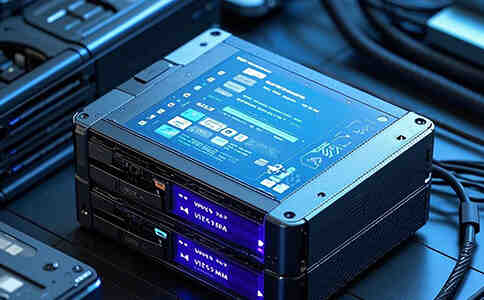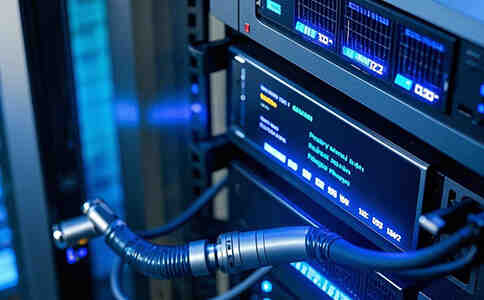In the wave of digital transformation, businesses are increasingly relying on servers to support daily operations, store data, and provide services. Renting servers has become a flexible IT infrastructure solution that helps businesses reduce costs while improving reliability and scalability. However, with so many server options available on the market, how should businesses make the right decision?

This article will guide you through the key factors to consider when choosing a rented server, helping businesses make informed decisions in server selection.
1. Understand Your Business Needs
First, businesses need to clarify their specific server requirements by understanding the scale and technical needs of their operations. Different types of businesses may require different types of servers. Below are a few common use case scenarios:
High Traffic Websites: If a business operates a high-traffic website, such as an e-commerce site or a news portal, it may require high-performance, high-bandwidth servers to handle large volumes of traffic. In this case, choosing servers with high processing power and stability is critical.
Data Storage Needs: For businesses that need to store large amounts of data, such as healthcare and finance industries, it’s important to consider the storage capacity, scalability, and data security of the servers.
High-Performance Computing: If the business involves big data analysis, artificial intelligence, or machine learning, it requires servers that support high concurrent processing with strong CPU and GPU resources.
Small Businesses: For startups or small to medium-sized enterprises (SMEs), cost-effectiveness is often a priority. These businesses may prefer servers suited for basic operations.
2. Performance Requirements and Configuration Selection
When selecting a rented server, performance configuration is a crucial factor based on the business needs. Here are some key components to consider:
CPU Performance: The CPU is the core of the server, impacting its computational ability and processing speed. Depending on the actual need, businesses should choose an appropriate CPU. Common choices include Intel Xeon and AMD EPYC server processors. For high-traffic websites or businesses requiring high concurrency, it’s recommended to select multi-core CPUs with high frequency.
RAM: The size of the RAM directly affects a server's ability to handle multiple tasks simultaneously and its response time. For applications with high memory demands, such as database management and big data processing, businesses should opt for servers with large memory configurations. Typically, 16GB or 32GB of RAM is sufficient for most medium-sized businesses, while high-end applications may require 128GB or more.
Storage: When choosing a server, businesses should consider their data storage needs and select the right type of hard drive. Common hard drives include HDDs (Hard Disk Drives) and SSDs (Solid-State Drives). SSDs offer faster read/write speeds and are suitable for performance-intensive applications, while HDDs are better for businesses with large-scale data storage needs due to their cost-effectiveness.
Bandwidth and Network Connection: The server’s bandwidth and network connectivity stability are crucial for business performance. Choosing appropriate bandwidth ensures that websites and applications run smoothly, especially for high-traffic applications. Cloud servers often provide on-demand bandwidth, allowing businesses to adjust resources flexibly according to their needs.
3. Reliability and Security
When selecting rented servers, businesses must consider both the reliability of the servers and the security of their data. Here are some critical factors:
Data Backup and Recovery: The reliability of a server goes beyond hardware; it should include a data backup and recovery plan. A reputable server provider will offer regular backups and disaster recovery services to ensure that business data is not lost in the event of an emergency.
Data Security: With the increasing number of cyberattacks, businesses need to prioritize data security. When renting servers, businesses should ensure that the service provider offers advanced security measures, such as firewalls, DDoS protection, encrypted storage, and VPN support. Regular security audits should be conducted to prevent potential data breaches.
Redundancy Design: High availability and redundancy are key to ensuring that servers do not experience single points of failure. Many rental server providers offer multi-layered redundancy designs to ensure that businesses can quickly recover in case of hardware failure.
4. Provider Support and Service Levels
Server rentals are not just about purchasing hardware; they are a service. Service quality is a vital consideration when selecting a provider. Here are a few factors to consider:
Technical Support: Businesses should select server providers that offer 24/7 technical support to address any sudden issues. Ensuring that businesses can quickly get technical support and solutions when facing system failures or performance problems is essential.
SLA (Service Level Agreement): An SLA is a set of service quality standards that a provider promises to deliver, typically including uptime, technical support response times, and more. Businesses should ensure the provider offers at least 99.9% uptime, meaning that server downtime should not exceed 45 minutes per month.
5. Cost and Budget Control
The cost of renting servers typically depends on factors like configuration, bandwidth, and storage, so businesses must allocate their budget effectively when selecting servers. While high-performance servers provide better performance, they also come with higher costs. For businesses with a limited budget, the following strategies can help control costs:
Pay-as-you-go: For businesses with fluctuating demand, cloud server solutions that charge based on usage are a good choice. Cloud services allow businesses to adjust resources based on actual needs, reducing waste.
Long-Term Contracts and Discounts: Some server providers offer discounts for long-term contracts, which is beneficial for businesses with stable requirements. Signing a long-term contract can help businesses enjoy lower monthly rental fees.
Hybrid Deployment: Some businesses may require both high-performance servers and cost reductions. In this case, a hybrid cloud deployment could be considered, where core business applications are hosted on high-performance servers, while non-critical applications are migrated to lower-cost virtual or shared servers.
6. Cloud Servers vs. Traditional Physical Servers
For many businesses, choosing between cloud servers and traditional physical servers is a critical decision. Cloud servers offer high flexibility, auto-scaling, and pay-per-use billing, making them ideal for businesses that need elastic resources. Traditional physical servers provide higher performance and control, suitable for businesses with strict hardware requirements.
For SMEs, cloud servers are generally a more cost-effective choice, while larger enterprises or those needing high-performance computing may prefer traditional physical servers.

Conclusion
Choosing the right rented server is one of the keys to a business's success. By analyzing business needs, making informed performance configuration choices, ensuring data security and reliability, considering technical support and service levels, and effectively controlling the budget, businesses can find the most suitable option from the many server rental solutions available. Whether opting for cloud servers or traditional physical servers, the key is to make a scientific decision based on business scale, technical requirements, and cost, ensuring that the business can stand out in a competitive market.
